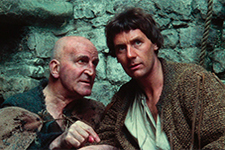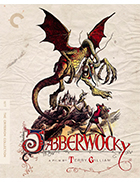Jabberwocky
|  Jabberwocky was Terry Gilliam’s transition film—his first solo directorial effort outside his role in the British comedy troupe Monty Python, with whom he had worked since its inception in 1969—and it feels very much like a film caught between Gilliam’s desire to define himself independently from Python and his indebtedness to the Python style of humor to which he had contributed for nearly a decade. Because fellow Python star Michael Palin plays the film’s lead and it looks and feels very much like the group’s previous effort, Monty Python and the Holy Grail (1975), it isn’t surprising that many people took Jabberwocky for another Python film or at least felt the urge to compare it to Holy Grail, usually to its detriment. Alas, Jabberwocky is not a particularly good film, even though it is an often clever and exceedingly efficient in its absurdist experimentation mixing fantasy and comedy and romance. It will also forever remain a fascinating glimpse into Gilliam’s process of emerging from the Python troupe and forging his own artistic identity, which he would do with much more success four years later with the indelible Time Bandits (1981), which also happened to feature a number of Python members, but was much more distinctly a work of Gilliam’s unique imagination. Jabberwocky takes as its launching point the Lewis Carroll poem, although the two have little in common outside of their title and a shared adoration of nonsense for its own sake. Set in dark, muddy, dank medieval England, Jabberwocky tells the tale of Dennis (Michael Palin), a decidedly ordinary and incredibly unimaginative young bumpkin trying to make a living as an apprentice to his father, a cooper who secretly loathes him because Dennis has no interest in his obsession with craftsmanship. Instead, he is engrossed in pedestrian business matters, especially as they pertain to Mr. Fishfinger (Warren Mitchell), whose grotesque daughter Griselda (Annette Badland) is the obscure object of Dennis’s wildly misplaced desire. Intent on making his own way in the world, Dennis leaves his small village and travels to the city to find employment so that he can one day marry Griselda. He finds this endeavor to be something of a challenge, especially since the walled city, which is overseen by the decrepit and senile King Bruno the Questionable (Max Wall), won’t even let him in at first. Once he gains entrance, he is catapulted into a bizarre netherworld that eventually finds him playing squire to a knight who earns the right to take on the titular monster, which has been mercilessly ravaging the countryside. Gilliam, who cowrote the screenplay with Charles Alverson, a novelist and co-editor of the early ’60s satirical magazine Help!, is quite merciless in his satirical targets, aiming the majority of his barbed arrows at the world of business and commerce, which are here lampooned via not only Dennis’s depressingly prosaic dreams of economic efficiency, but also the medieval merchants who don’t want the marauding beast destroyed because he’s good for business (just as it does now, fear drives consumption and profit). Bloodshed means both money and dominance, which Gilliam satirizes in the film’s most brutally funny sequence that finds King Bruno, his exasperated counselor Passelewe (John Le Mesurier), and his borderline princess daughter (Deborah Fallender) splattered with increasingly copious geysers of gore from the knights who are being killed in the king’s misguided tournament to crown a champion to take on the Jabberwock (he is incapable of seeing that having the tournament be to the death is depriving him of dozens of would-be warriors). Palin anchors the film with his guileless protagonist, who is amusingly naïve, but not much else. Jabberwocky is a much more consistent film than Holy Grail (which Gilliam co-directed), but it lacks that film’s utter commitment to anarchic glee. Gilliam, in a way, is trying to be more direct in Jabberwocky, and even when he lets it slide into absurdity (such as the knights playing hide and seek to determine a champion), it never quite takes off into the sublime heights reached again and again by Holy Grail. The ultimate problem is that it feels like Gilliam never decided what he wanted Jabberwocky to be. There are bits and pieces of Pythonesque mayhem that work wonderfully, but other scenes fall flat or feel truncated, as if Gilliam wanted to cut loose and play it straight at the same time. He remains committed to the idea that the grimy world of the Middle Ages has a grotesque visual humor all its own, and one of the most mordantly funny bits has Dennis meeting a fellow cooper who, unable to gain employment, has simply cut off his foot and started begging with great success (the bloody foot, of course, is sitting right with him—how did this film get a PG rating, again?). Gilliam and cinematographer Terry Bedford compose some genuinely gorgeous imagery, and the film feels much more expensive that it actually was (in interviews, Gilliam has spun some great stories about trying to make use of standing sets and conveying huge castle interiors with little more than black velvet and carefully placed lights). In that regard, Jabberwocky is a triumph of economical ingenuity, but one can’t help but wish that its oddball balance of absurdist humor and straightforward fantasy-adventure felt more of a piece.
Copyright © 2018 James Kendrick Thoughts? E-mail James Kendrick All images copyright © The Criterion Collection | |||||||||||||||||||||||||||||||
Overall Rating: 

 (2.5)
(2.5)


